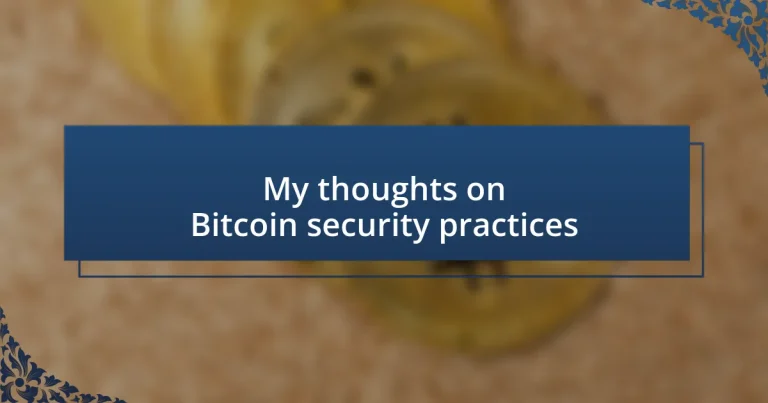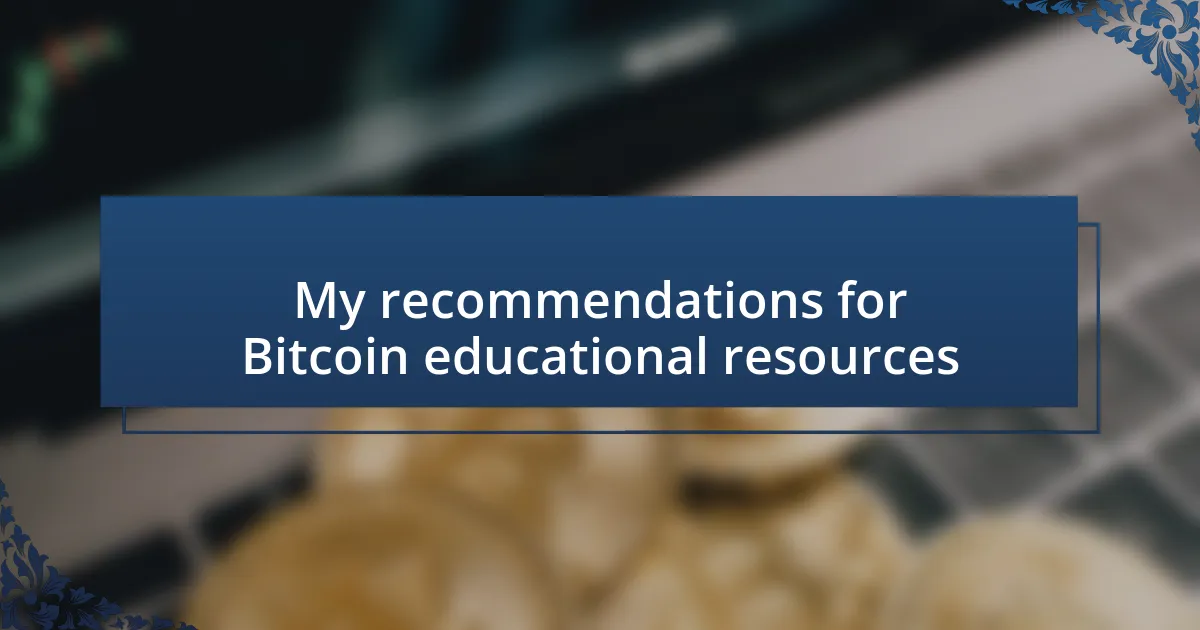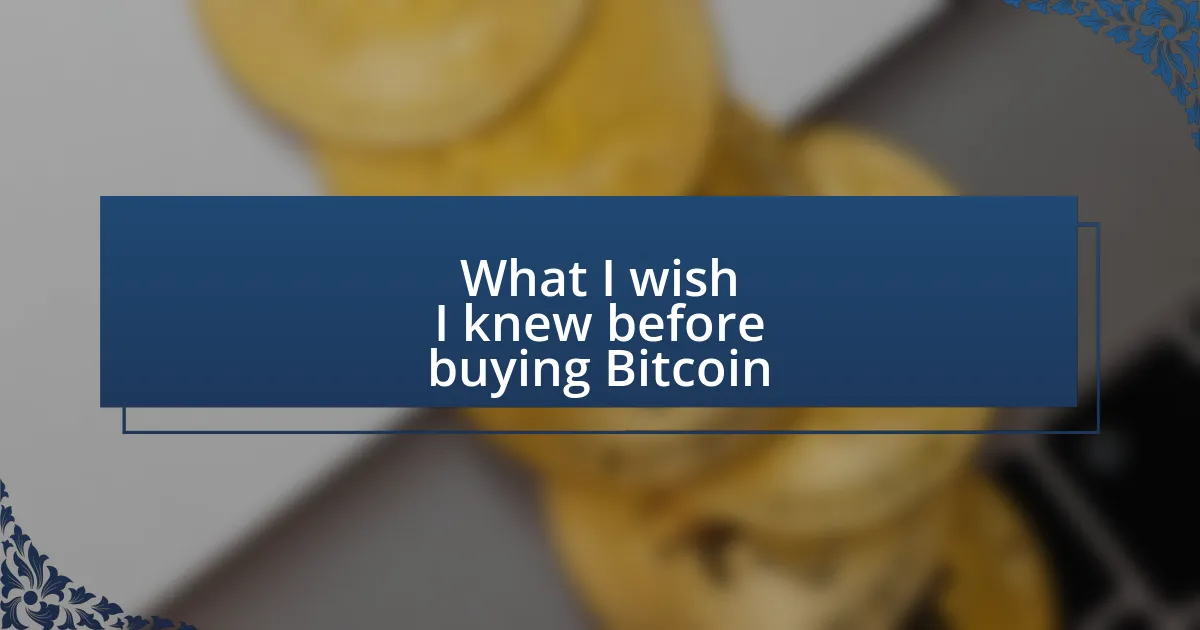Key takeaways:
- Backing up recovery phrases and using strong, unique passwords is essential for Bitcoin security.
- Using hardware wallets and enabling two-factor authentication (2FA) significantly enhances asset protection.
- Staying informed about security threats and regularly updating software are crucial in maintaining Bitcoin integrity.
- Diversifying storage methods and continuously monitoring accounts mitigates risks associated with cyber threats.
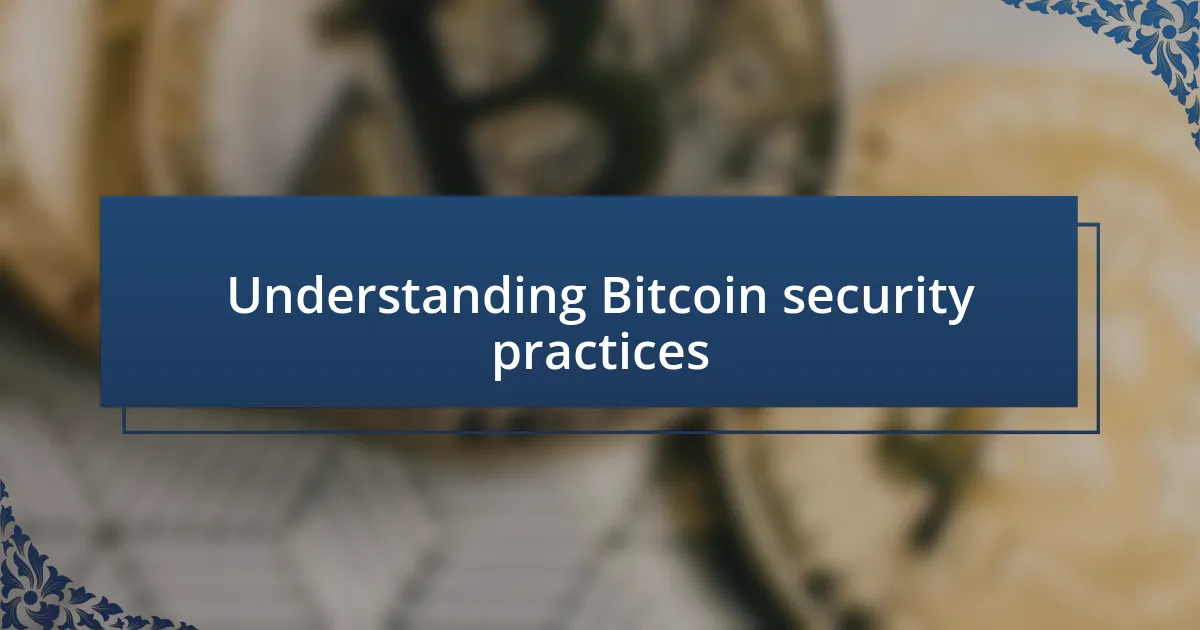
Understanding Bitcoin security practices
Understanding the security practices surrounding Bitcoin is crucial for anyone venturing into the world of cryptocurrency. One time, I lost access to a wallet containing a small amount of Bitcoin because I underestimated the importance of backing up my recovery phrase. That experience highlighted for me that simple lapses in security can lead to significant losses.
I often ponder why some people still take shortcuts with their Bitcoin security. Using strong, unique passwords for wallets and two-factor authentication isn’t just a recommendation; it should be the bare minimum. I’ve seen countless forums where users share stories of compromised accounts, largely due to lax security measures. These narratives resonate deeply with me, as they remind me of how easily trust can be breached in the digital realm.
Additionally, keeping your Bitcoin offline in hardware wallets can provide a layer of security that is hard to overlook. I remember setting up my first hardware wallet; it felt like I was taking my financial safety into my own hands. There’s a certain peace of mind in knowing that your assets are stored away from the constant hustle of online threats. Have you ever felt that distinct sense of security when you take proactive measures with your digital assets? It can truly change the way you think about your investments.
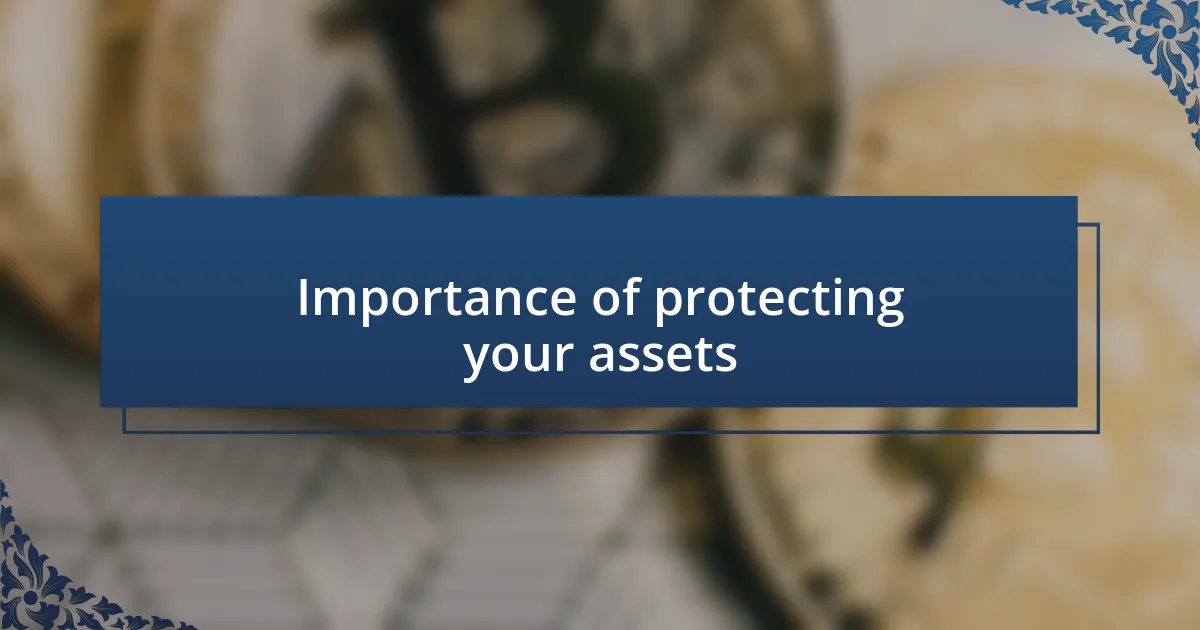
Importance of protecting your assets
Protecting your assets isn’t just about avoiding losses; it’s about maintaining peace of mind in a volatile market. I recall the anxiety I felt after hearing about a friend who lost a significant amount of Bitcoin due to a phishing attack. It was a stark reminder that threats can come from anywhere, and those moments of vulnerability can haunt you. The security of your investment plays a vital role in how you engage with cryptocurrencies.
Here are some key points to consider:
- Cyber attacks are a real threat, and one wrong click can lead to devastating consequences.
- Regularly updating your security methods can keep you one step ahead of potential assailants.
- Awareness and education about current risks can empower you to make informed decisions.
- Diversifying storage methods, such as using a combination of hardware wallets and cold storage, minimizes risk.
- Continuous monitoring of your accounts adds an extra layer of vigilance that can be crucial during a crisis.
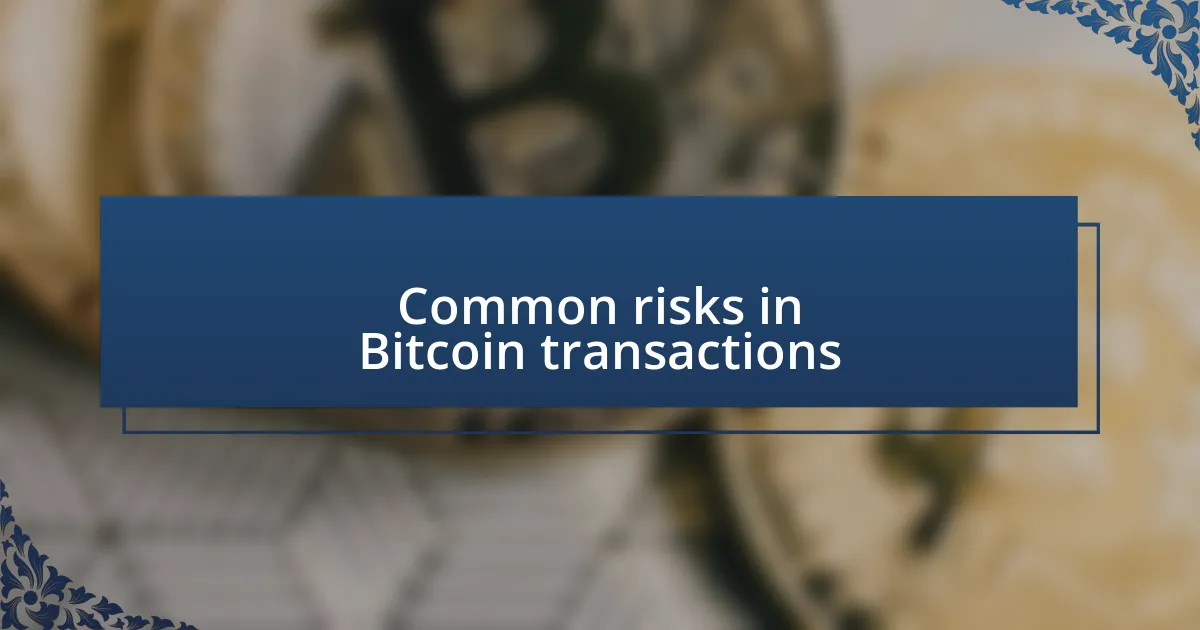
Common risks in Bitcoin transactions
When it comes to Bitcoin transactions, the risks can be surprisingly diverse. One of the most alarming aspects is the potential for ransomware attacks. I remember reading about a case where a business was locked out of its files and demanded to pay thousands in Bitcoin to regain access. That incident was a devastating example of how cybercriminals exploit vulnerabilities, and it left me questioning how secure our interactions with cryptocurrencies truly are.
Another common risk I often warn friends about is transactional errors. Just last month, a colleague mistakenly entered the wrong wallet address while attempting to transfer his Bitcoin. The thought of sending funds into the digital abyss is enough to induce heart palpitations. It’s a reminder that unlike traditional banking, Bitcoin transactions aren’t reversible, making attentiveness essential at every step.
Lastly, scams often lurk in the shadows of the Bitcoin landscape. I once clicked on what I thought was a legitimate investment opportunity, only to realize it was a sophisticated phishing scheme. It made me realize how critical it is to validate sources before engaging with any platform. This experience taught me to adopt a cautious approach, as the stakes can be exceptionally high when it comes to our hard-earned investments.
| Risk Type | Description |
|---|---|
| Ransomware Attacks | Cybercriminals lock your files and demand Bitcoin for release. |
| Transactional Errors | Sending Bitcoin to the wrong address can lead to irretrievable losses. |
| Scams and Phishing | Fraudulent schemes trick users into revealing sensitive information. |
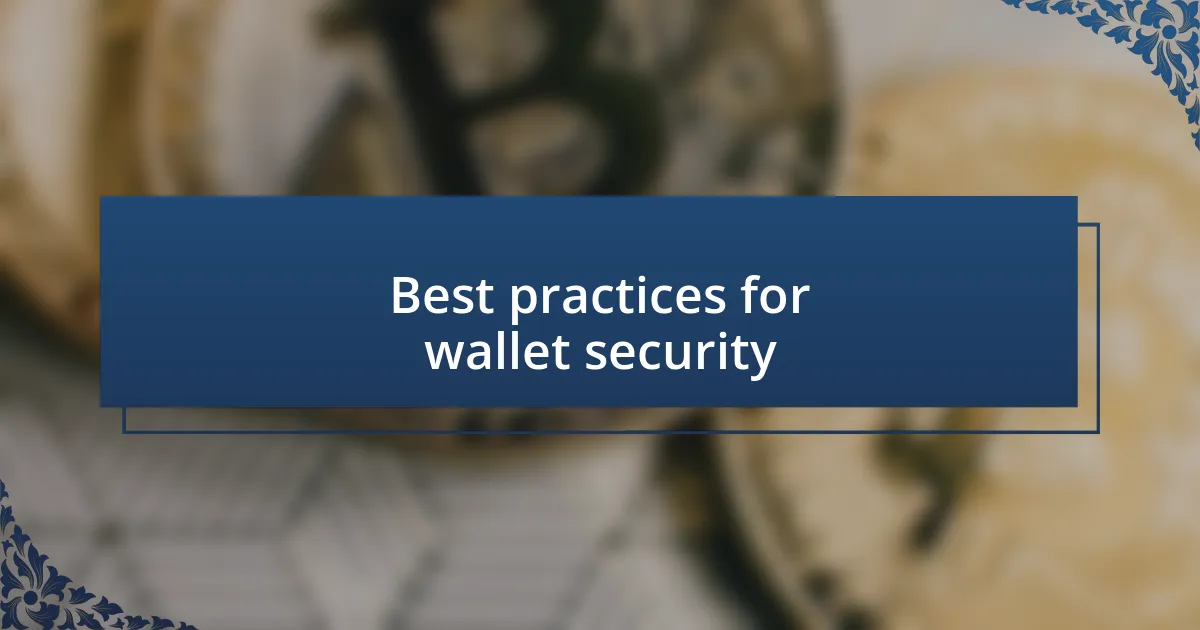
Best practices for wallet security
To ensure robust wallet security, I always recommend using hardware wallets whenever possible. These devices store your private keys offline, minimizing the risk of cyberattacks. I’ve personally found that having a dedicated hardware wallet gives me peace of mind, knowing my investments are safe from online threats.
It’s crucial to enable two-factor authentication (2FA) on any wallet that supports it. I remember the moment I set it up for my own wallet; the extra layer of security felt like an invulnerable shield. Have you ever stopped to think about how easily your funds could be compromised without such a simple step?
Regularly updating software is another vital practice. There was a time when I neglected software updates, thinking they were unnecessary. But then I learned about vulnerabilities that hackers exploit, and it hit home – if I had updated sooner, I could have prevented access to my wallet. Staying current not only protects you but shows you’re taking your wallet’s security seriously.
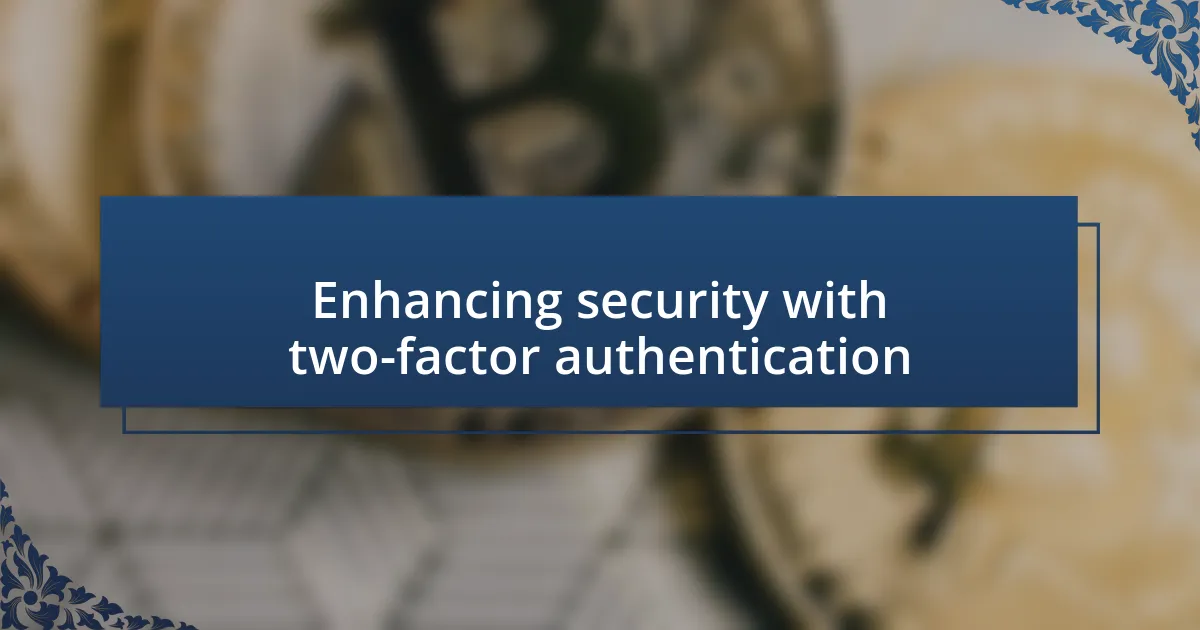
Enhancing security with two-factor authentication
Enabling two-factor authentication (2FA) transformed the way I approached security. The shift happened after I read an alarming statistic about how quickly accounts can be compromised—often in minutes. It made me realize that while a good password is essential, it can’t stand alone. Have you ever wondered how much stronger your defenses could be with an extra step?
One evening, I recall attempting to log into my wallet and being prompted for a code sent to my phone. At that moment, I felt a surge of relief, knowing that even if someone had my password, they would still need that code. It was a stark reminder of how a small tweak in my security routine could significantly reduce my vulnerability; I can’t stress enough how empowering it feels to add that layer of protection.
Moreover, the convenience of 2FA is often overlooked. I remember hesitating to set it up because I thought it would be a hassle. But, once I got it configured, I found that it seamlessly integrated into my routine. Have you considered how such a simple tool can elevate your sense of security, making you feel like you’re actively safeguarding your digital assets?
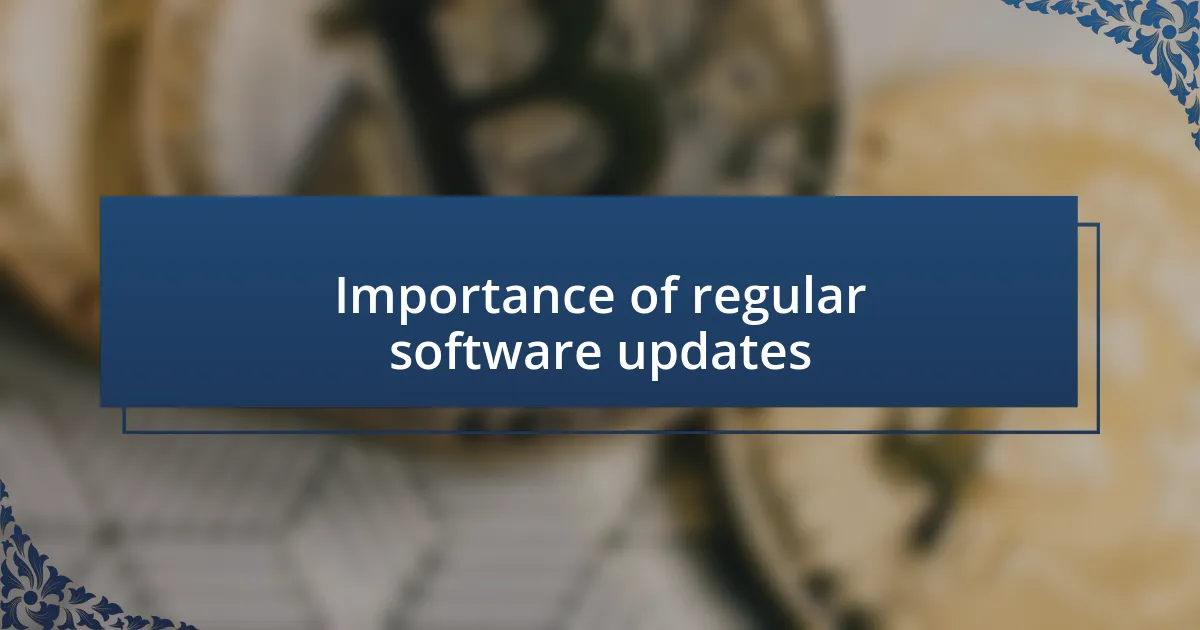
Importance of regular software updates
Keeping software up to date is crucial for maintaining the integrity of your Bitcoin security. I vividly remember the unease I felt when I discovered that a long-overdue software update for my wallet was available. That moment hit me harder than I expected; I realized an outdated version could leave me open to exploits that hackers were just waiting to take advantage of. Have you ever considered how quickly threats can evolve?
Regular updates often include important security patches that address known vulnerabilities. The relief I experienced when I clicked that update button was almost tangible, knowing I was taking proactive steps to protect my assets. It’s amazing how something so simple can have such a profound impact on your security posture; by consistently updating, I can sleep easier at night.
Additionally, I’ve learned that many updates come with enhancements that can improve the user experience. I was pleasantly surprised to find new features in my wallet that not only made it easier to navigate but also offered additional security options I hadn’t even considered before. Isn’t it comforting to know that staying up to date can bring both security and convenience into your digital life?
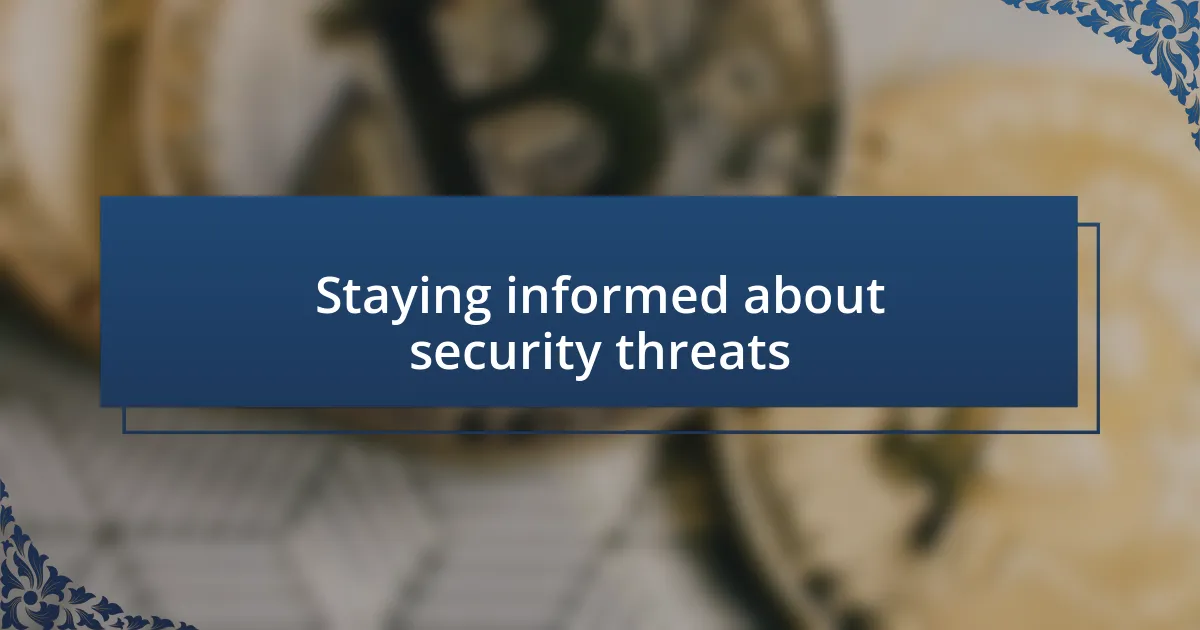
Staying informed about security threats
Staying informed about evolving security threats is a vital part of securing your Bitcoin investments. I recall a time when I stumbled upon a cybersecurity newsletter that revealed a new phishing scam targeting crypto users. That eye-opening moment served as a powerful reminder of how crucial it is to remain vigilant; it made me wonder, how many victims had fallen prey to this scam simply because they weren’t aware?
I’ve found that regularly following trusted crypto news sources not only keeps me updated on security issues but also prepares me for potential risks. There’s a certain discomfort that comes with feeling unprepared. It’s like walking through a dark alley without a flashlight. Wouldn’t you agree that being informed empowers you to make smarter decisions about your assets?
Participating in online forums or local meetups can also provide valuable insights into emerging threats. A friend of mine shared a harrowing story about losing a portion of his holdings due to a weak password. Engaging with others in the crypto community has helped me learn from their experiences, reinforcing my own security practices. Don’t you think that collaborative learning could be a game changer in enhancing our collective security?

